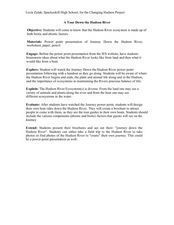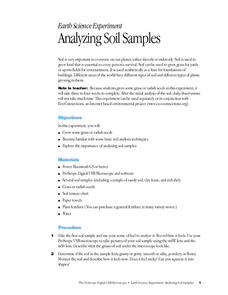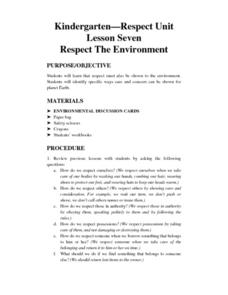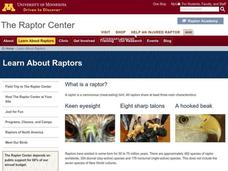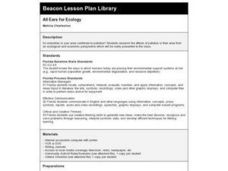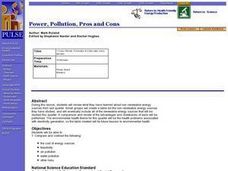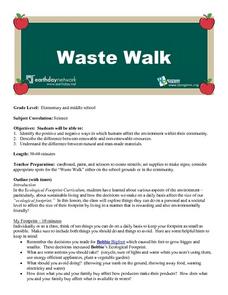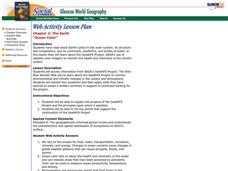Curated OER
Oil Well That Ends Well
Focusing on the effect of oil spills on the environment, learners conduct experiments to explore this issue. First, they create an ocean environment using materials provided. Then, they make a simulated crude oil substance from vegetable...
Curated OER
A Tour Down the Hudson River
Students discuss how the Hudson River is an ecosystem made up of both biotic and abiotic factors. They view the PowerPoint the Journal Down the Hudson River. Students become aware of where the Hudson River begins and ends, the plant and...
Curated OER
Zebra Mussel Population Simulation
Students are taught how to format and enter data into an Excel spreadsheet. They make a graph, and interpret graphed data. Students discuss the possible impacts of zebra mussels on the Hudson river. They graph zebra mussel data.
Curated OER
Urban Ecosystems 4: Metabolism of Urban Ecosystems
Cities are compared to living, breathing, metabolizing organisms. Fourth in a five-part series of lessons, this one focuses on the flow of materials through a city. Links to interesting websites and images make your delivery of...
Curated OER
Analyzing Soil Samples
Students grow grass or radish seeds in this experiment, which takes three to four weeks to complete. They become familiar with basic soil analysis techniques, as well as, explore the importance of analyzing soil samples.
Curated OER
Recycling-Taking it Easy on the Environment
Learners review the garbage/landfill graphs included with the lesson. They discuss the information on the graphs and discuss which garbage products come from their homes. Students collect examples of over packaging to share with class...
Curated OER
"What If The Earth Were Made Of Sand
Students examine the most common characteristics of clay and sand, and to understand how the properties of these materials affect the erosion of the landscape and the formation of the many landforms. They explore clay and sand through...
Curated OER
Class Presentation on Coal
Did you know that coal was formed from plants? After being assigned a coal-related topic, groups gather, organize, and present information about this energy source. The presentations should include visuals like graphs, charts, tables,...
Curated OER
Kindergarten-Respect Unit (Lesson Seven) Respect The Environment
Students review the concept of respect and that they should respect, not only themselves, but those around them. They comment on some example pictures in which the environment is NOT being respected and decide what should have been done...
Curated OER
Protecting Philippine Reefs
Students watch a slide show about the Philippine Reefs to explore the topic of fish populations. In this reef and fish population lesson, students watch a slide show about fish populations and how the Peace Corps works...
Curated OER
March of the Polar Bears: Global Change, Sea Ice, and Wildlife Migration
Students study global change and how these changes impact wildlife. In this polar bears lesson plan students analyze maps and data to understand climate change.
Curated OER
River Study
Students study physical features of a local stream. They study how to identify water features on topographic maps.
Curated OER
Wetland Wonders
Young scholars describe the characteristics of wetlands. They demonstrate their understanding of the importance of wetlands to humans and wildlife and determine they are defined by the presence of water, and specialized soils.
Curated OER
Class Conservation Corps (CCC)
Students investigate how the loss of soil, a valuable natural resource, affects their lives through loss of productive land to grow food, loss of coastal land mass, and poor water quality from runoff. They design a project to keep soil...
Curated OER
All Ears for Ecology
Fourth graders research to see the effects that air pollution has on where they live. They explore improper dumping of waste run-off, air pollution, and water pollution.
Curated OER
Power, Pollution, Pros and Cons
Students review what they know about non-renewable energy, compare and contrast advantages and drawbacks of each type, such as cost of energy sources, feasibility, air pollution, water pollution, and other risks, and create table listing...
Curated OER
African Elephant Overpopulation Problem
Students investigate the problem of elephant overpopulation. They identify the components of the watering hole as found in Addo Elephant National Park. They also pretend to be part of the environment and act out the part in a class drama...
Curated OER
Creating Communities
Students design a community with minimal environmental impact. They rate each other's community's presentation using the "Planning and Zoning Commission Rating Scale".
Curated OER
Sodium Bentonite Swelling Index
Students research the effects of sodium bentonite being combined with water. They discuss the reasons why this chemical is used in landfills. They measure the swelling index of sodium bentonite clay.
Curated OER
Environment: Waste Walk
Young scholars assess the positive and negative affects of humans on the environment. The lesson explores ways in which individuals and societies can reduce the negative impact on the environment. By taking a "waste walk" around their...
Curated OER
Environment: Mock Trial
Learners role-play a trial regarding the taking of family property for a new water purification plant. Among the roles are the judge, attorneys, witnesses, plaintiff, mayor, and jury members. Once both sides present their case, the...
Curated OER
Arkansas and Louisiana Purchase Wetlands
Students experiment to determine the value and importance of wetlands in Arkansas. They develop an environmental appreciation for wetlands.
Curated OER
DRY UP BABY ! ANHYDROBIOSIS (freeze drying)
In this lab, students explore how organisms are able to survive the extreme environmental conditions found in the Polar regions. Students observe and draw active living rotifers and Tardigrades, design and perform experiments to collect...
Curated OER
Ocean Color
Students examine NASA's SeaWiFS Project Web site to explore how the SeaWiFS Project monitors environmental and climatic changes in the oceans and atmosphere. They answer questions and write a summary in support of continued funding for...

